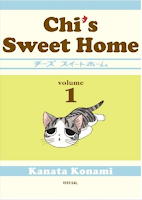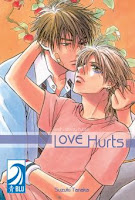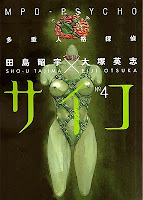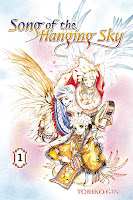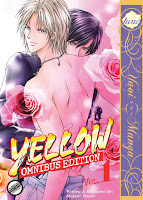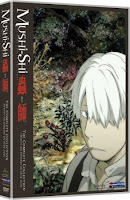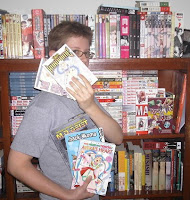My News and Reviews
February has come to an end, but there is still time to enter Experiments in Manga’s most recent manga giveaway for a chance to win the first volume of Ken Akamatsu’s newest series UQ Holder!, published in English by Kodansha Comics. (The winner will be announced on Wednesday, so get those entries in!) Also last week, I posted two in-depth reviews. The first was of Yaya Sakuragi’s manga Hide and Seek, Volume 1. Because Sakuragi was my introduction to boys’ love manga I tend to be interested in and enjoy her work, but I think Hide and Seek may very well be one of her strongest series yet. The second review I posted was of Richard Reeves’ nonfiction work Infamy: The Shocking Story of the Japanese American Internment in World War II. Technically the book won’t be released until April, but I received an advance copy from the publisher. It’s an informative though strongly worded examination of the internment camps and the service of Japanese Americans in the military during the war.
Elsewhere online, MangaBlog‘s Brigid Alverson has a new gig writing about manga for Barnes and Noble’s Sci-Fi & Fantasy Blog. The Comics Journal has an interview with Breakdown Press, which includes additional information about its manga releases. Paste Magazine posted an overview of Fantagraphics’ manga publishing efforts. Seven Seas made two license announcements: Eiji Matsuda’s My Monster Secret and Kashiwa Miyako’s The Testament of Sister New Devil. Yen Press snuck some license announcements in over the weekend as well: Ryukishi07 and Souichirou’s Rose Gun Days: Season 1, Takatoshi Shiozawa’s Final Fantasy Type-0: The Reaper of the Icy Blade, and Daisuke Hagiwara’s Horimiya. Also of note, Drawn & Quarterly will be publishing a new paperback edition of Seiichi Hayashi’s Red Colored Elegy (bringing it back into print) which will include an essay by Ryan Holmberg not found in the original hardcover release. Finally, Graham Kolbeins put together a short documentary, The House of Gay Art, about a private museum in Japan devoted to the preservation of homoerotic artwork.
Quick Takes
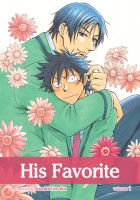 His Favorite, Volumes 1-7 by Suzuki Tanaka. I didn’t realize it at first since His Favorite is so completely different, but I actually read (and enjoyed) another of Tanaka’s boys’ love manga several years ago—her collection of short stories Love Hurts. Whereas Love Hurts tended to be a little on the dark side, His Favorite is most definitely a comedy. For the most part, it’s fairly chaste as well. I had actually intended to only read a few volumes last week, but I found myself enjoying the series so much that I ended up reading everything that is currently available in English. There’s really not much of a plot to His Favorite, just an entertaining set up and cast of characters. I especially adore Yoshida, the series’ protagonist who, with his short stature, unpopularity, and somewhat strange appearance, is an extraordinarily atypical boys’ love lead. Then there’s Sato, the other half of the manga’s main couple, who makes all the girls (and some of the guys) literally swoon. Honestly, although he has good looks, Sato is not a very nice person. He does, however, love Yoshida dearly. Of course, since he’s also a sadist, he loves tormenting and teasing him, too. While some aspects of their relationship are questionable, His Favorite is a genuinely amusing series.
His Favorite, Volumes 1-7 by Suzuki Tanaka. I didn’t realize it at first since His Favorite is so completely different, but I actually read (and enjoyed) another of Tanaka’s boys’ love manga several years ago—her collection of short stories Love Hurts. Whereas Love Hurts tended to be a little on the dark side, His Favorite is most definitely a comedy. For the most part, it’s fairly chaste as well. I had actually intended to only read a few volumes last week, but I found myself enjoying the series so much that I ended up reading everything that is currently available in English. There’s really not much of a plot to His Favorite, just an entertaining set up and cast of characters. I especially adore Yoshida, the series’ protagonist who, with his short stature, unpopularity, and somewhat strange appearance, is an extraordinarily atypical boys’ love lead. Then there’s Sato, the other half of the manga’s main couple, who makes all the girls (and some of the guys) literally swoon. Honestly, although he has good looks, Sato is not a very nice person. He does, however, love Yoshida dearly. Of course, since he’s also a sadist, he loves tormenting and teasing him, too. While some aspects of their relationship are questionable, His Favorite is a genuinely amusing series.
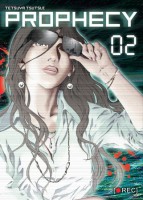 Prophecy, Volume 2 by Tetsuya Tsutsui. I was very impressed by the first volume of Prophecy and so was looking forward to reading the second a great deal. One of the reasons Prophecy works so well is that the intense social drama the manga deals in feels incredibly relevant. Paperboy’s desire for justice is understandable, but the methods employed by the group of vigilantes really can’t be condoned, though there are many who find their actions satisfying and even entertaining. The sudden shift in Paperboy’s popularity, the increase in the support of the group despite its blatant criminal activity, the appearance of copycats, the Anti Cyber Crimes Division becoming the villains in the eyes of the public, and many of the other developments found in the second volume of Prophecy are frighteningly believable. Internet culture can be extremely toxic and the manga presents a plausible scenario resulting from that. Though I didn’t find the second volume to be quite as compelling the first—much of the manga is focused on the chase rather than the character’s underlying motivations—Prophecy continues to be an excellent series; I’ll definitely be picking up the third and final installment.
Prophecy, Volume 2 by Tetsuya Tsutsui. I was very impressed by the first volume of Prophecy and so was looking forward to reading the second a great deal. One of the reasons Prophecy works so well is that the intense social drama the manga deals in feels incredibly relevant. Paperboy’s desire for justice is understandable, but the methods employed by the group of vigilantes really can’t be condoned, though there are many who find their actions satisfying and even entertaining. The sudden shift in Paperboy’s popularity, the increase in the support of the group despite its blatant criminal activity, the appearance of copycats, the Anti Cyber Crimes Division becoming the villains in the eyes of the public, and many of the other developments found in the second volume of Prophecy are frighteningly believable. Internet culture can be extremely toxic and the manga presents a plausible scenario resulting from that. Though I didn’t find the second volume to be quite as compelling the first—much of the manga is focused on the chase rather than the character’s underlying motivations—Prophecy continues to be an excellent series; I’ll definitely be picking up the third and final installment.
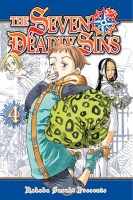 The Seven Deadly Sins, Volumes 4-6 by Nakaba Suzuki. Currently, the fights in The Seven Deadly Sins are probably what appeal to me most about the series, but they can also be a rather frustrating part of the manga. The problem is that when everyone is so incredibly overpowered, and because Suzuki seems to be making up new abilities and powers on the fly, the battles have a tendency to lose their meaning; it never feels like anyone is in danger of actually losing anything of significance. So far, when supposedly important deaths and sacrifices do occur in the series, it tends to be side characters who have barely managed to establish themselves that are falling victim. As a result, the impact isn’t as great as it could or should be. These particular volumes of The Seven Deadly Sins feature a good number of battles, which admittedly can be entertaining. Unfortunately, for the most part the plot falls by the wayside and the protagonists don’t even approach the fighting tournament that they have entered intelligently. However, I was happy that the fourth volume included a side story that explores Ban’s background a bit more since he continues to be my favorite character in The Seven Deadly Sins.
The Seven Deadly Sins, Volumes 4-6 by Nakaba Suzuki. Currently, the fights in The Seven Deadly Sins are probably what appeal to me most about the series, but they can also be a rather frustrating part of the manga. The problem is that when everyone is so incredibly overpowered, and because Suzuki seems to be making up new abilities and powers on the fly, the battles have a tendency to lose their meaning; it never feels like anyone is in danger of actually losing anything of significance. So far, when supposedly important deaths and sacrifices do occur in the series, it tends to be side characters who have barely managed to establish themselves that are falling victim. As a result, the impact isn’t as great as it could or should be. These particular volumes of The Seven Deadly Sins feature a good number of battles, which admittedly can be entertaining. Unfortunately, for the most part the plot falls by the wayside and the protagonists don’t even approach the fighting tournament that they have entered intelligently. However, I was happy that the fourth volume included a side story that explores Ban’s background a bit more since he continues to be my favorite character in The Seven Deadly Sins.

